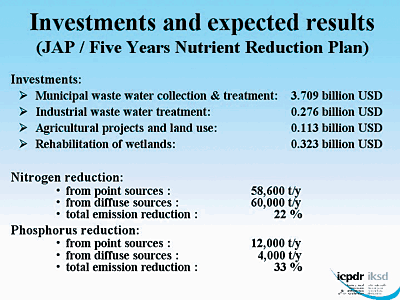The ICPDR Joint Action Program is a major step forward in reaching the Danube River Basin environmental objectives. Through it, the countries of the Danube community have made a clear statement that their governments are committed to the care of environmental protection in their vicinity. One of the important features of the JAP is the combination and diversity of large-scale measures it envisages for water pollution reduction, conservation, restoration of ecosystems and long-term sustainable management of the environment by the governments and the private sector in the Danube countries. This variety of the Danube pollution reduction measures emphasises two things. Firstly, it makes it clear that environmental protection and management concern all countries across the basin. Secondly, it shows that the most appropriate solutions to our identified pollution hot spots and problems lie in an efficient partnership between all stakeholders.
As policy makers very well know, it is only if a plan or a project reaches the very practical level of implementation that it has a chance to make a difference. When it comes to water pollution reduction, a joint action by countries bordering each other is needed if the flow of nutrients and emissions of harmful substances from agricultural, domestic and industrial sources are to be reduced thus contributing to the overall reduction of pollution towards the Black Sea.
Concerning cross-border water pollution, the Joint Action Programme anticipates that investments will be needed to help individual countries meet their domestic environmental goals. Donors might choose to endorse cross-border projects, which will involve a level of co-operation conducive to larger reductions in pollution than might be achieved by spending the same resources in one country alone.
Estimating the cost of cleaning up the Danube River is an almost impossible task. Nevertheless, the JAP estimates that an investment of Euro 4.404bn will be needed in the 2001-2005 period in order to respond to priority needs in the sectors covering municipal waste water collection and treatment, industrial waste water treatment, and agricultural pollution and land use.
General awareness about the Danube River as a priceless regional asset has been growing. Since the environment is increasingly recognized as the vital link between the quality of human life and sustainable development, there is also a growing awareness among national governments, industrial and large agricultural plants managers of the need to consider the interests of all stakeholders when making decisions about the environment. The management of water resources and protection of the environment must be planned for the long-term to ensure a sustainable, wise use of the resources. That is exactly what the Joint Action Program does and what makes it a valuable tool.
